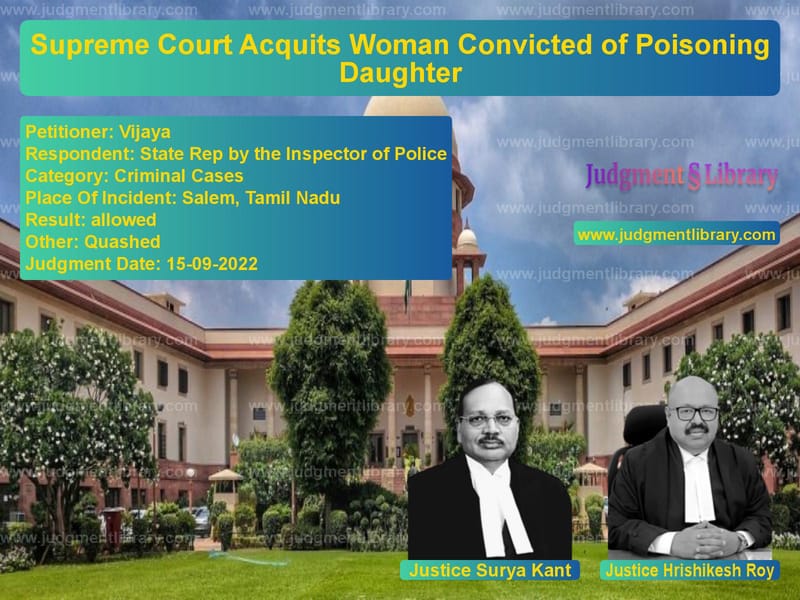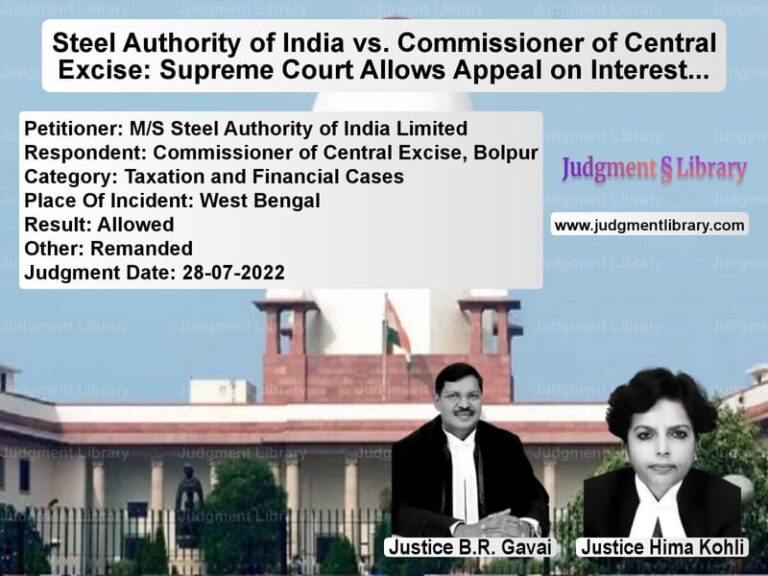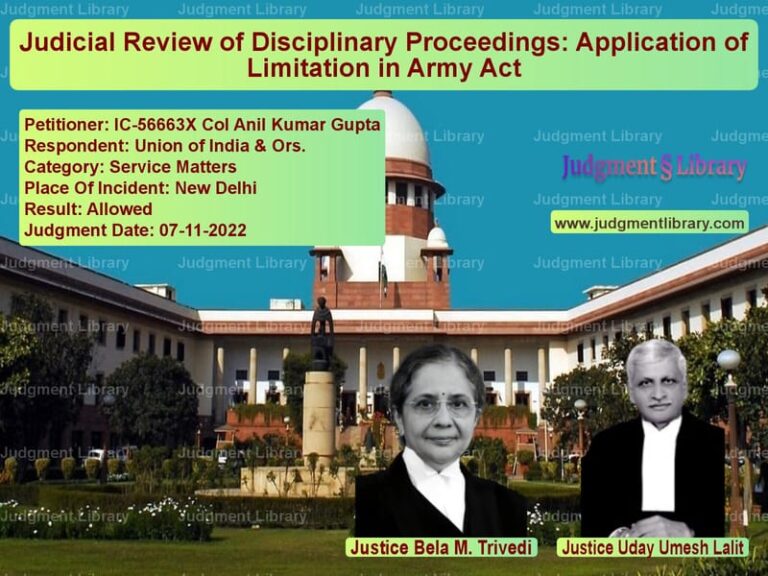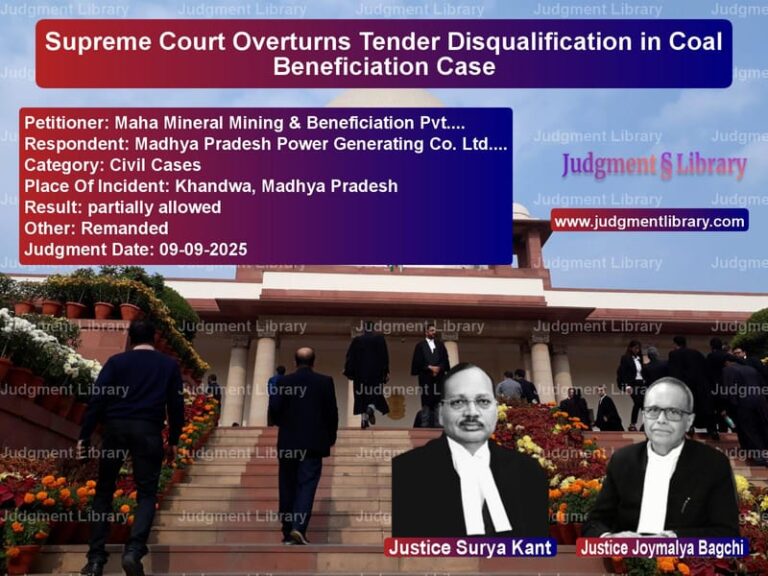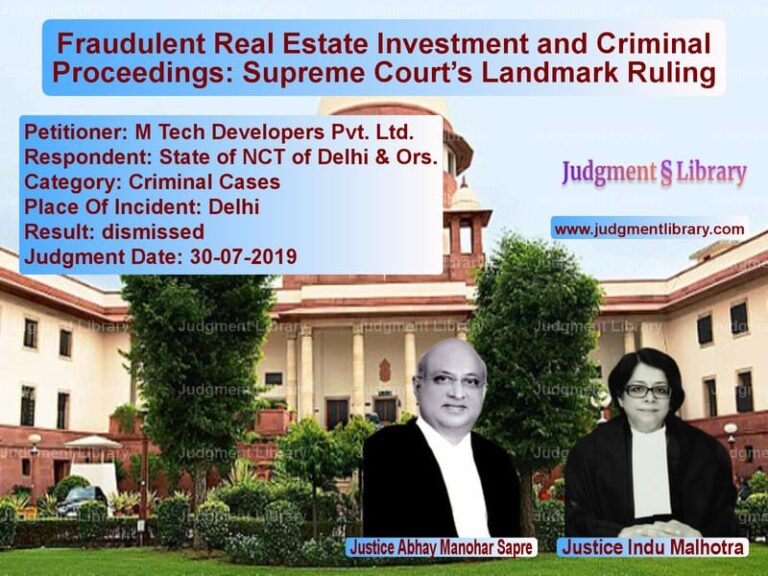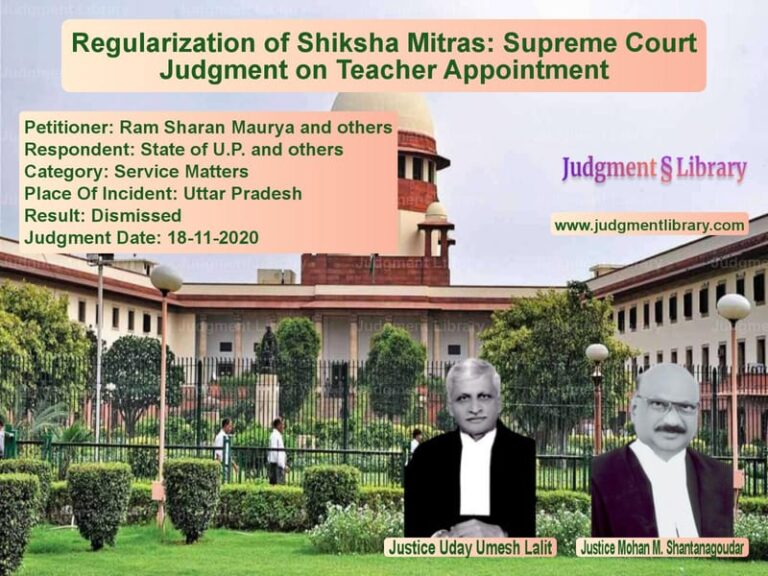Supreme Court Acquits Woman Convicted of Poisoning Daughter
The tragic case of Vijaya, a woman convicted of poisoning her 10-month-old daughter, raises crucial legal questions regarding dying declarations, confessions, and the principle of reasonable doubt in criminal trials. The Supreme Court’s ruling in this matter sheds light on the reliability of statements recorded during medical emergencies and the necessity of corroborative evidence in criminal proceedings.
Background of the Case
Vijaya, the appellant, was married to Mani @ Allimuthu. After two years of marriage, they had a daughter. One day, following a family quarrel allegedly due to her failure to cook sufficient food for her in-laws, Vijaya reportedly attempted suicide by consuming a poisonous substance called Odeuvanthlai. She also administered the poison to her infant daughter. When her husband returned home from work on October 10, 2012, he found both Vijaya and the child unconscious. They were immediately taken to Vinayaga Mission Hospital, Salem, where the child succumbed to poisoning on October 13, 2012.
Legal Proceedings
Upon regaining consciousness, Vijaya allegedly made a dying declaration (Exhibit P-20), recorded by a Judicial Magistrate on October 11, 2012. Her husband reported the incident to the police, leading to her prosecution under Sections 302 (murder) and 309 (attempt to commit suicide) of the Indian Penal Code (IPC).
Trial Court Judgment
The Principal Sessions Judge, Namakkal, found Vijaya guilty under Sections 304(1) IPC (culpable homicide not amounting to murder) and 309 IPC. The court sentenced her to:
- One year of imprisonment under Section 304(1) IPC along with a fine of ₹5,000, with an additional three months of imprisonment in default of payment.
- Six months of imprisonment under Section 309 IPC with a fine of ₹1,000.
High Court Decision
Vijaya challenged her conviction in the High Court of Madras, but the appeal was dismissed. The High Court upheld the trial court’s findings based primarily on the alleged dying declaration (Exhibit P-20). The High Court concluded:
“The appellant has clearly admitted that she consumed poison due to stomach pain and also gave the poison to the child. The statement under Section 164 of Cr.P.C., made before the Judicial Magistrate, and the evidence of the doctor that she had consumed poison, corroborated by other evidence, leave no doubt regarding her guilt.”
Petitioner’s Arguments
Vijaya’s counsel challenged the conviction on the following grounds:
- The so-called dying declaration (Exhibit P-20) could not be treated as such because Vijaya survived.
- The alleged statement should have been classified under Section 164 of the Code of Criminal Procedure (Cr.P.C.), requiring stringent scrutiny.
- The prosecution failed to provide corroborative evidence beyond the disputed statement.
- Key witnesses, including the husband (PW1) and father-in-law (PW5), turned hostile and did not support the prosecution.
- Medical evidence only confirmed poisoning but did not establish intent or involvement beyond reasonable doubt.
Respondent’s Arguments
The State contended:
- The dying declaration recorded by the Magistrate was sufficient proof of guilt.
- The medical report confirmed that both the appellant and her daughter consumed the same poison.
- The testimony of the treating doctor (PW8) supported the prosecution’s version of events.
- The trial court and High Court correctly rejected the claim of police coercion in obtaining the statement.
Supreme Court’s Analysis
The Supreme Court, led by Justices Surya Kant and Hrishikesh Roy, critically examined the legality and evidentiary value of the so-called dying declaration. The Court emphasized:
1. A Statement Made by a Survivor Is Not a Dying Declaration
The Court cited State of U.P. v. Veer Singh (2004) 10 SCC 117 and ruled:
“When the maker of a purported dying declaration survives, it does not fall under Section 32 of the Indian Evidence Act. Instead, it is treated as a statement under Section 164 Cr.P.C., which can be used only for corroboration or contradiction, not as primary evidence.”
Read also: https://judgmentlibrary.com/juvenility-in-criminal-cases-a-legal-battle-for-justice/
2. The Burden of Proof in Criminal Cases
The Court stressed that guilt must be proven beyond reasonable doubt and cited State of Haryana v. Bhagirath (1999) 5 SCC 96:
“A criminal court could be convinced of guilt only beyond the range of reasonable doubt… Reasonable doubt is one that survives the scrutiny of an honest and conscientious judicial mind.”
3. Hostile Witnesses Undermined the Prosecution Case
Vijaya’s husband (PW1) and father-in-law (PW5) turned hostile, weakening the prosecution’s case. The Court observed that no effort was made to reconcile their initial statements with later testimony.
4. The Absence of Corroborative Evidence
The Court noted that beyond the alleged confession, there was no strong evidence proving Vijaya’s intent to kill her daughter. The Court remarked:
“When considering the appellant’s guilt, the Sessions Judge and the High Court did not satisfactorily consider the effect of key prosecution witnesses turning hostile.”
5. Failure to Consider Alternate Theories
Vijaya had claimed that she and her daughter consumed poisoned honey given by strangers. While this was disbelieved by lower courts, the Supreme Court ruled that the failure to investigate this claim introduced reasonable doubt.
Read also: https://judgmentlibrary.com/supreme-court-acquits-two-trade-union-leaders-in-assam-murder-case/
Supreme Court’s Verdict
The Supreme Court overturned the conviction and acquitted Vijaya, holding that:
- The statement recorded as a dying declaration was legally inadmissible as primary evidence.
- There was insufficient corroborative evidence beyond the disputed statement.
- The hostile witnesses and alternative theories created reasonable doubt regarding Vijaya’s guilt.
- The High Court and trial court failed to adequately evaluate the nuances of the case.
The Court ruled:
“For the reasons aforesaid, the appeal is allowed, and the judgment of the trial court and High Court are set aside.”
Conclusion
This case serves as a vital precedent on the admissibility of survivor statements as evidence. The Supreme Court’s ruling reiterates the necessity of corroboration in criminal cases and upholds the principle that reasonable doubt should favor the accused. By ensuring that criminal convictions are based on strong, unimpeachable evidence, this judgment strengthens the safeguards of justice in India’s legal system.
Petitioner Name: Vijaya.Respondent Name: State Rep by the Inspector of Police.Judgment By: Justice Surya Kant, Justice Hrishikesh Roy.Place Of Incident: Salem, Tamil Nadu.Judgment Date: 15-09-2022.
Don’t miss out on the full details! Download the complete judgment in PDF format below and gain valuable insights instantly!
Download Judgment: vijaya-vs-state-rep-by-the-ins-supreme-court-of-india-judgment-dated-15-09-2022.pdf
Directly Download Judgment: Directly download this Judgment
See all petitions in Suicide Cases
See all petitions in Murder Cases
See all petitions in Judgment by Surya Kant
See all petitions in Judgment by Hrishikesh Roy
See all petitions in allowed
See all petitions in Quashed
See all petitions in supreme court of India judgments September 2022
See all petitions in 2022 judgments
See all posts in Criminal Cases Category
See all allowed petitions in Criminal Cases Category
See all Dismissed petitions in Criminal Cases Category
See all partially allowed petitions in Criminal Cases Category

